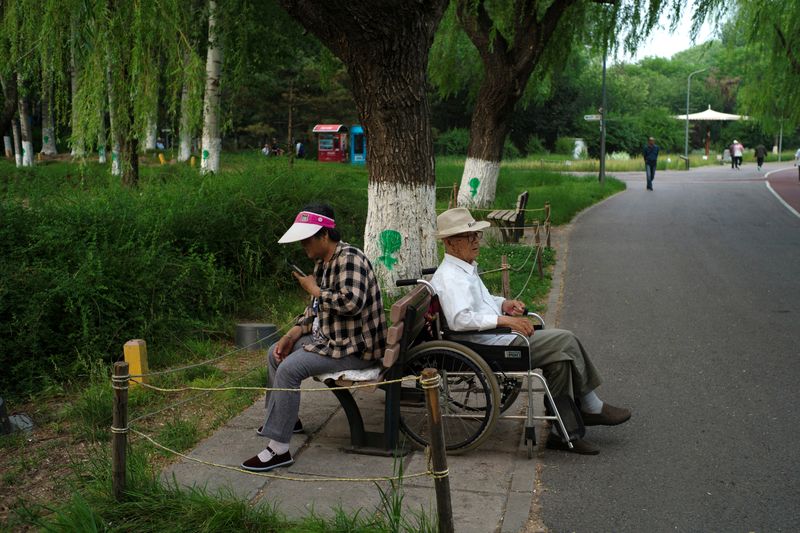By Farah Master
HONG KONG (Reuters) - China's move to raise retirement ages is a starting point to plug gaping pension deficits and bolster a shrinking workforce but more pain lies ahead as the economy slows, making further reforms urgent, say economists and demographers.
Aging populations are a global phenomenon, but the issue is particularly stark in China due to the legacy of its one-child-policy, which was in place for three decades and has exacerbated its demographic challenges.
China’s number of births dropped to 9 million last year and the United Nations forecasts China's working age population will decline by nearly 40% by 2050 from 2010 if fertility rates remain at current levels.
Both older and younger workers have expressed worries about the changes as policymakers grapple with widespread discrepancies between rural and urban pensions, maintaining public stability and high youth unemployment.
"They need to solve the pension problem now because this is when they still have some growth to finance the deficit," said Alicia Garcia Herrero, Natixis' chief economist for Asia Pacific.
China's economic growth rate has slowed from around 8% in the early 2000s to around 5% now and could be as low as 1% after 2035, she said.
Wary of public concerns, Chinese lawmakers fast-tracked the policy without public consultation in September, changing retirement ages that had been set in the 1950s.
Life expectancy in China has risen to 78 years as of 2021 from about 44 in 1960 and projected to exceed 80 by 2050.
Chinese Premier Li Qiang said the reform is a "significant move" to improve China's social security system and "better safeguard and improve people's livelihoods," according to the Xinhua official news agency.
Still, China's state-led basic pension system is under significant financial pressure.
About one-third of China's provincial-level jurisdictions are running pension deficits. China’s Academy of Social Sciences has estimated the pension system will run out of money by 2035 without reforms.
Monthly urban pensions range from roughly 3,000 yuan ($425) in less-developed provinces to about 6,000 yuan in Beijing and Shanghai. Rural pensions, introduced nationwide in 2009, are meagre.
VOLUNTARY
China's cohort of those aged 60 and older is expected to rise at least 40% to more than 400 million by 2035, equal to the populations of Britain and the United States combined.
Migrant workers, who typically receive poor pensions, continue to work into their older years versus state-sector employees with relatively generous government pensions who have less incentives to opt into the higher retirement ages.
The contribution period needed to receive a pension in China will rise to 20 years from 15, starting in 2030.
Expanding the contribution time frame further "especially in the context of the current state of the gig and informal economy could make it harder for many blue-collar workers to be eligible to receive their pension," said Stuart Gietel-Basten, professor at the Hong Kong University of Science and Technology.
The initial fiscal impact from the raising retirement ages will likely be muted because the increases are largely voluntary, said Ernan Cui, China consumer analyst at Gavekal Dragonomics.
"Raising the retirement age may entail only a limited fiscal gain for now...The coming increase will effectively be optional for many workers, though the increase in the minimum contribution period to obtain a pension will not," she said.
John Wang, an analyst at Moody's (NYSE:MCO) Ratings, said the new legislation could pose a social risk due to China's demographic challenges and income inequalities.

"Successful implementation of China’s retirement age reforms will depend on managing risks...such as the skill set of the elderly population, the available jobs and their adaptability to developments in technology and innovation."
($1 = 7.0465 Chinese yuan renminbi)